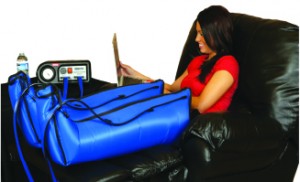 Finding the source of your edema is vital to getting the proper medical care. Chronic edema left untreated without a clinical diagnosis may lead to a variety of problems. Patients with chronic edema may start the day out with painless swelling in their limbs that progress’s throughout the day leading to a sensation of heaviness in the limb by the evening. Common condition’s where edema may be a symptom is venous insufficiency, post-operative trauma, infection, and lymphedema. These conditions can be easily misdiagnosed as acute and minor swelling followed with minimal treatment. Pneumatic compression devices are one of the most highly recommended treatments for these conditions and are recognized by Medicare.
Finding the source of your edema is vital to getting the proper medical care. Chronic edema left untreated without a clinical diagnosis may lead to a variety of problems. Patients with chronic edema may start the day out with painless swelling in their limbs that progress’s throughout the day leading to a sensation of heaviness in the limb by the evening. Common condition’s where edema may be a symptom is venous insufficiency, post-operative trauma, infection, and lymphedema. These conditions can be easily misdiagnosed as acute and minor swelling followed with minimal treatment. Pneumatic compression devices are one of the most highly recommended treatments for these conditions and are recognized by Medicare.
Lymphedema and Chronic Venous Insufficiency
Lymphedema is the body’s inability to transport lymph fluid through the lymphatic system resulting in chronic swelling. Lymphedema may manifest after a surgical procedure cancer or non-cancer related (example hysterectomy or gallbladder removal); due to its slow progression it may take years or months to recognize. When left untreated common complications include cellulitus or lymphangitis, skin changes such as skin thickening, restricted movement of a limb, or chronic wounds. Aside from surgical procedures and radiotherapy for cancer other known triggers for lymphedema include vein stripping, peripheral vascular surgery, trauma, inflammation, infection, and insect bites.
Chronic venous insufficiency is another condition that causes swelling in the legs along with open wounds. CVI occurs when the valves in the veins that normally channel the blood to the heart become damaged which then leads to pooling of the blood in the lower extremities. Discoloration of the skin, referred to as hemosiderin staining, is identified by a reddish staining of the lower limb is outcome of venous insufficiency as well as other cardiovascular diseases. Venous insufficiency may cause secondary lymphedema when the lower region of the leg becomes permanently swollen from the trapped protein rich fluid which may then begin to harden. Patient’s with Venous Insufficiency who experience severe and persistent edema overtime can lead to trapped protein rich fluid. The lower region of the leg may then become permanently swollen and may start to harden.
It is imperative that any type of limb edema is treated quick and effectively, regardless of the severity. Individuals have shown the best results when treatment is started when the first sign of a edema is present. Many patients use diuretics or compression stockings receiving temporary reduction in swelling. If your compression stockings get worn out over time many patients aren’t receiving the needed compression. Diuretics may be harmful over time if your edema is a symptom of chronic venous insufficiency or lymphedema.
Treatment
A widely recognized and highly effective treatment is using a compression pump. This is a safe and effective way to assist your body’s circulatory system in moving the excess fluid which has accumulated in the limb and can cause painful swelling, non-healing wounds, heaviness, and discomfort decreasing your mobility. The compression pump is a gentle massaging technique that compresses in a rythmatic cycle, similar to that of a normally functioning lymphatic system that has not been damaged. This is a great treatment option for patients who have tried compression stocking, elevation, diuretics, or massage with little or no relief.
Specialists in Acute Wound Care
Remember, ANY swelling is an indication of an over-loaded Lymphatic system. Acute Wound Care, LLC is a highly focused local provider of wound products and compression pumps working with select area physicians highly versed in this condition. For more information and articles on this topic, Google “Acute Wound Care,” visit www.AcuteWoundCare.com, or call 239-949-4412 and speak with a specialist. Remember, nothing heals faster than an educated patient.
ACUTE WOUND CARE
For more information and articles on this topic,
Google “Acute Wound Care”
or visit www.AcuteWoundCare.com
or call 239-949-4412
and speak with a specialist
Check Also
Trusted Homecare Agency: Serving Veterans with Free Supplemental Home Healthcare
When it comes to healthcare, veterans deserve the best care possible. For veterans seeking in-home …
 South Florida Health and Wellness Magazine Health and Wellness Articles
South Florida Health and Wellness Magazine Health and Wellness Articles




